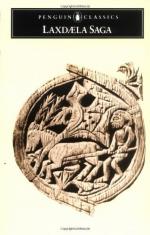land.” The king drew a gold ring off his
arm that weighed a mark, and gave it to Hoskuld; and
he gave him for another gift a sword on which there
was half a mark of gold. Hoskuld thanked the
king for his gifts, and for all the honour he had
done him. [Sidenote: Hoskuld’s arrival in
Iceland] After that Hoskuld went on board his ship,
and put to sea. They had a fair wind, and hove
in to the south of Iceland; and after that sailed
west by Reekness, and so by Snowfellness in to Broadfirth.
Hoskuld landed at Salmon-river-Mouth. He had the
cargo taken out of his ship, which he took into the
river and beached, having a shed built for it.
A ruin is to be seen now where he built the shed.
There he set up his booths, and that place is called
Booths’-Dale. After that Hoskuld had the
timber taken home, which was very easy, as it was
not far off. Hoskuld rode home after that with
a few men, and was warmly greeted, as was to be looked
for. He found that all his belongings had been
kept well since he left. Jorunn asked, “What
woman that was who journeyed with him?” Hoskuld
answered, “You will think I am giving you a
mocking answer when I tell you that I do not know her
name.” Jorunn said, “One of two things
there must be: either the talk is a lie that
has come to my ears, or you must have spoken to her
so much as to have asked her her name.”
Hoskuld said he could not gainsay that, and so told
her the truth, and bade that the woman should be kindly
treated, and said it was his wish she should stay in
service with them. Jorunn said, “I am not
going to wrangle with the mistress you have brought
out of Norway, should she find living near me no pleasure;
least of all should I think of it if she is both deaf
and dumb.” Hoskuld slept with his wife
every night after he came home, and had very little
to say to the mistress. [Sidenote: Melkorka’s
history discovered] Every one clearly saw that there
was something betokening high birth in the way she
bore herself, and that she was no fool. Towards
the end of the winter Hoskuld’s mistress gave
birth to a male child. Hoskuld was called, and
was shown the child, and he thought, as others did,
that he had never seen a goodlier or a more noble-looking
child. Hoskuld was asked what the boy should be
called. He said it should be named Olaf, for
Olaf Feilan had died a little time before, who was
his mother’s brother. Olaf was far before
other children, and Hoskuld bestowed great love on
the boy. The next summer Jorunn said, “That
the woman must do some work or other, or else go away.”
Hoskuld said she should wait on him and his wife, and
take care of her boy besides. When the boy was
two years old he had got full speech, and ran about
like children of four years old. Early one morning,
as Hoskuld had gone out to look about his manor, the
weather being fine, and the sun, as yet little risen
in the sky, shining brightly, it happened that he
heard some voices of people talking; so he went down
to where a little brook ran past the home-field slope,




